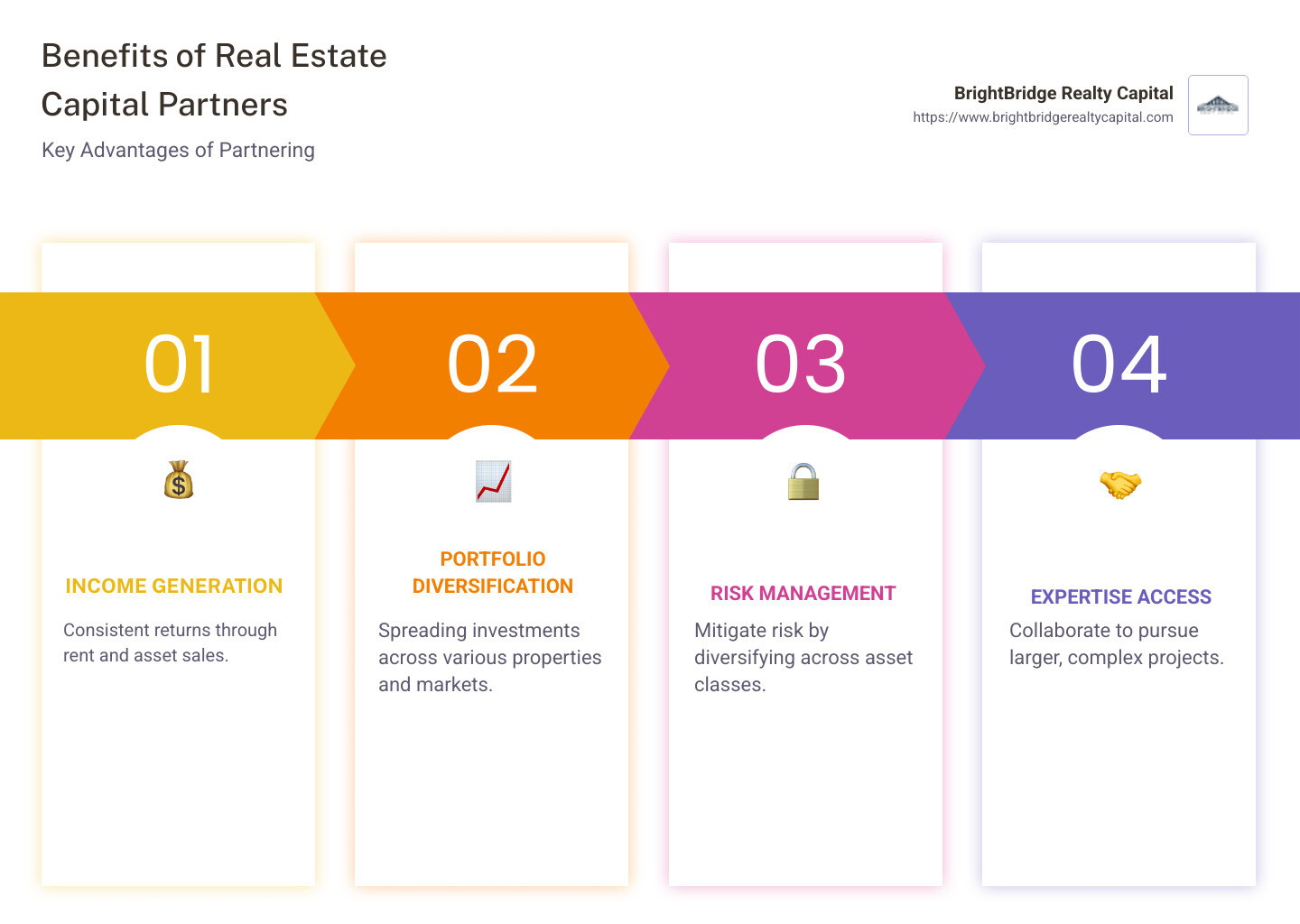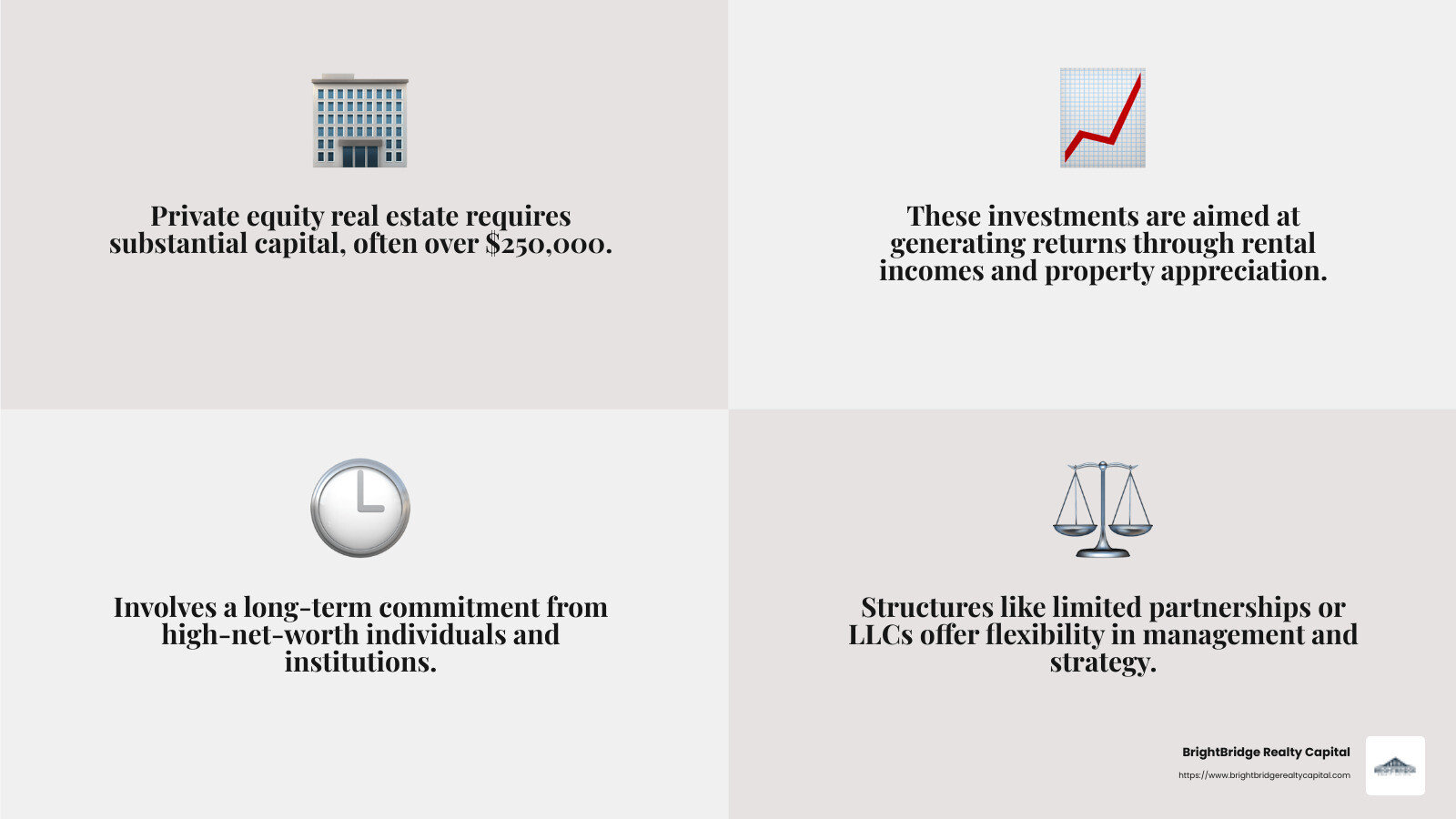Partnering for Profit: The Role of Real Estate Capital Partners

Real estate capital partners play a critical role in investing by pooling resources and expertise to tap into lucrative real estate opportunities. These partnerships are pivotal for changing financial inputs into tangible property assets. Here's a quick rundown:
- Real Estate Investing: Collaborate to acquire, develop, and manage properties.
- Income Generation: Earn consistent returns through rent and asset sales.
- Portfolio Diversification: Mitigate risk by spreading investments across various property types and markets.
Real estate investing serves multiple purposes: generating regular income, protecting against inflation, and diversifying investment portfolios. By investing in real estate, you not only earn from rental income but also stand to benefit from property appreciation over time. Diversification, by spreading investments across different asset classes and geographies, helps manage risk and stabilize returns.
Partnerships in real estate bring together capital and expertise, making it possible to pursue larger and more complex projects than an individual investor might manage alone. These partnerships capitalize on growth opportunities that arise from both stable, long-term rental income and strategic sales of properties.
Real estate capital partners are essential in creating a robust and varied investment portfolio that balances risk and maximizes returns.

Simple real estate capital partners glossary:
Understanding Real Estate Capital Partners
Real estate capital partners are crucial players in private equity and real estate markets. They pool resources and expertise to invest in real estate, an alternative asset class that offers unique opportunities and challenges.
Private Equity in Real Estate
Private equity real estate involves pooling investments to acquire, finance, and manage properties. Unlike public REITs, these investments are typically available to high-net-worth individuals and institutions like pension funds. The aim is to generate returns through rental incomes, property appreciation, and strategic sales.
- High Entry Barrier: Requires substantial capital, often over $250,000, and a long-term commitment.
- Structured Investments: Often organized as limited partnerships or LLCs, offering flexibility in management and strategy.

Real Estate Markets
The real estate market is dynamic, influenced by economic trends, interest rates, and demographic shifts. Real estate capital partners leverage these changes to identify profitable investment opportunities.
- Diverse Property Types: Investments can range from residential and commercial to land and hospitality.
- Geographic Spread: Targeting growth markets, such as the Southeastern and Southwestern U.S., to capitalize on regional economic strength.
Alternative Asset Class
Real estate is considered an alternative asset class, distinct from stocks and bonds. It offers several benefits:
- Inflation Protection: Real estate values often rise with inflation, providing a hedge against inflationary pressures.
- Portfolio Diversification: Low correlation with traditional asset classes means adding real estate can reduce overall portfolio risk.
Real estate capital partners play a vital role in the private equity real estate landscape by providing the capital and expertise needed to steer complex markets. They help investors achieve diversification and risk-adjusted returns through strategic investments in varied property types and regions.
Key Strategies of Real Estate Capital Partners
When it comes to real estate capital partners, understanding their strategies is key to grasping how they generate returns and create value. Two primary strategies stand out: value-add and opportunistic strategies, both of which focus on alpha generation—or the ability to outperform the market.
Value-Add Strategies
In the field of real estate, value-add strategies involve purchasing properties that are not quite at their full potential. These properties may require some level of improvement, whether through physical renovations, improved management, or leasing up vacant spaces.
Renovation and Repositioning: As seen in the case study where a portfolio of multifamily properties underwent renovation, these strategies can significantly increase rental income and property value.
Management Improvements: By changing or enhancing property management practices, real estate capital partners can turn underperforming assets into profitable ventures.
This approach isn't just about fixing up a property—it's about changing it to open up greater value.
Opportunistic Strategies
Opportunistic strategies are designed for those looking to take on higher risk for the potential of higher returns. These strategies often involve acquiring properties or land that require significant redevelopment or are in underperforming markets.
Development Projects: These can include new constructions or extensive redevelopment of existing properties. The goal is to create or transform assets that can command higher market values.
Market Timing: Opportunistic strategies often involve buying when markets are down and selling when they recover, requiring keen market insight and timing.
These strategies are complex and require skilled execution, but they can deliver substantial returns when managed effectively.
Alpha Generation
Alpha generation is the ultimate goal of these strategies. By identifying and acting on opportunities that others might overlook, real estate capital partners aim to achieve returns above the market average.
Under-Managed Assets: With low institutional ownership in some real estate markets, there are opportunities to acquire and improve these assets, creating value where others might not see it.
Strategic Partnerships: By partnering with vertically-integrated managers, real estate capital partners can leverage in-house expertise across investment, operations, and capital markets to execute these complex strategies successfully.
Real estate capital partners use their expertise and resources to identify and capitalize on opportunities that can deliver superior returns. Whether through value-add renovations or opportunistic market plays, their strategies are designed to maximize potential and drive growth.
Benefits of Partnering with Real Estate Capital Partners
When considering a partnership with real estate capital partners, several key benefits can improve your investment portfolio. These include risk-adjusted returns, diversification, and tax advantages. Let's break these down.
Risk-Adjusted Returns
One of the standout benefits of working with real estate capital partners is the potential for risk-adjusted returns. This means you're not just chasing high returns—you're considering the level of risk involved and aiming for the best possible return for that risk.
Proven Track Record: For example, many real estate capital partners have a long track record of delivering strong internal rates of return and multiple investor returns. These figures illustrate how effective strategies can lead to substantial returns.
Strategic Execution: By employing value-add and opportunistic strategies, real estate capital partners are able to mitigate risks while pursuing high returns. Their ability to reposition assets and improve management can turn underperforming properties into profitable investments.
Diversification
Diversification is another significant benefit. By including real estate in your portfolio, you are spreading your investments across different asset classes, which can reduce overall risk.
Variety of Property Types: Real estate capital partners often invest in a mix of property types, such as multifamily, hospitality, and land investments. This variety helps shield investors from market volatility in any one sector.
Geographical Spread: Investing in properties across different regions, especially high-growth markets, can further mitigate risk. For instance, targeting markets in the Southern and Southwestern United States, known for their robust growth, can be advantageous.
Tax Advantages
Real estate investments can offer meaningful tax advantages, particularly for U.S. taxpayers. These can include deductions for depreciation, mortgage interest, and property taxes.
Depreciation Benefits: Real estate capital partners can help investors steer tax benefits like depreciation, which allows for the deduction of a portion of the property's cost over time.
Pass-Through Income: Investments structured as partnerships, such as Real Estate Limited Partnerships (RELPs), pass income directly to investors, who can then benefit from lower tax rates on this income.
Partnering with real estate capital partners not only provides a route to potentially high returns but also offers a strategic way to diversify your portfolio and take advantage of tax benefits. These factors make real estate a compelling option for investors looking to improve their financial strategy.
Next, we'll explore how these partners steer market cycles and economic trends to optimize investment strategies.
The Role of Real Estate Capital Partners in Market Cycles
Market cycles and economic trends play a crucial role in shaping investment strategies for real estate capital partners. Understanding these cycles helps partners make informed decisions that can lead to profitable outcomes.
Navigating Market Cycles
Real estate markets, like all markets, go through cycles. These cycles include periods of growth, stability, decline, and recovery. Real estate capital partners are skilled at identifying where the market is in its cycle and adjusting their strategies accordingly.
Growth Phase: During periods of growth, partners may focus on value-add strategies to capitalize on increasing property values. This involves improving properties to increase their value and rental income.
Stability Phase: In stable markets, core and core-plus strategies are often employed. These strategies focus on acquiring high-quality properties with steady cash flows, providing a cushion against market volatility.
Decline and Recovery Phases: During downturns, opportunistic strategies come into play. Partners seek undervalued or distressed properties that can be acquired at a lower cost and repositioned for future growth.
Responding to Economic Trends
Economic trends such as interest rates, inflation, and employment rates also impact real estate investments. Real estate capital partners keep a close eye on these trends to adjust their strategies.
Interest Rates: Changes in interest rates can affect borrowing costs and property values. Partners may adjust their investment approach based on these fluctuations to ensure favorable financing terms and maximize returns.
Inflation: Real estate is often considered a hedge against inflation. As inflation rises, so do property values and rental incomes, which can improve the returns for investors.
Employment Rates: Economic health and employment rates influence demand for real estate. In areas with strong job growth, partners might focus on acquiring residential or commercial properties to meet the increased demand.
Strategic Adjustments
By understanding market cycles and economic trends, real estate capital partners can tailor their strategies to optimize investments. This adaptability is key to achieving risk-adjusted returns in varying economic conditions.
Data-Driven Decisions: Partners use data and analytics to forecast market movements and make informed investment decisions. This approach helps in identifying high-potential opportunities even in uncertain times.
Diverse Investment Portfolio: Maintaining a diverse portfolio allows partners to mitigate risks associated with any single market segment. This includes investing in different property types and regions to spread risk.
In summary, the ability of real estate capital partners to steer market cycles and respond to economic trends is a significant advantage. By employing strategic adjustments based on current conditions, they can optimize investment outcomes and ensure long-term profitability.
Next, we'll address some frequently asked questions about real estate capital partners to further clarify their role and benefits.
Frequently Asked Questions about Real Estate Capital Partners
What are real estate capital partners?
Real estate capital partners are specialized investment firms or individuals that provide the financial backing needed to acquire, develop, or manage real estate projects. They pool resources from investors to invest in real estate assets, focusing on generating returns through strategic management and capital improvements. These partners play a crucial role in the real estate market by offering expertise, resources, and connections to maximize the potential of real estate investments.
How do real estate capital partners generate returns?
Real estate capital partners generate returns through several key strategies:
Value-Add Strategies: These involve acquiring properties that have potential for improvement. By renovating or repositioning these properties, partners can increase their value and rental income, thus enhancing returns. A case study from Realty Capital Partners demonstrated this approach, where a portfolio of multifamily properties was acquired and renovated, resulting in above-target returns.
Opportunistic Strategies: Partners seek out distressed or undervalued properties that can be acquired at a lower cost. Through strategic repositioning or redevelopment, they aim to significantly increase the property's value.
Income Generation: Real estate investments generate income through rent, providing a steady cash flow. This is particularly valuable in stable markets where consistent rental income can cushion against market volatility.
What are the risks involved with real estate capital partners?
Investing with real estate capital partners comes with its own set of risks:
Market Risk: Real estate markets are subject to fluctuations. Changes in economic conditions, interest rates, and local demand can impact property values and rental income.
Development Risk: Projects involving redevelopment or new construction may face delays, cost overruns, or regulatory challenges, affecting the anticipated returns.
Liquidity Risk: Real estate investments are typically long-term and less liquid compared to other asset classes. Investors may find it challenging to exit an investment quickly without potentially incurring a loss.
Management Risk: The success of real estate investments heavily relies on the expertise of the management team. Poor management decisions can lead to underperformance of the investment.
Despite these risks, real estate capital partners are skilled in mitigating them through thorough due diligence and strategic planning. They leverage their expertise to steer challenges and optimize investment outcomes, making real estate an attractive asset class for many investors.
Next, we'll explore how BrightBridge Realty Capital offers customized financing solutions to improve real estate investment opportunities.
Conclusion
Partnering with real estate capital partners can open doors to lucrative investment opportunities. At BrightBridge Realty Capital, we specialize in providing customized financing solutions custom to the unique needs of our clients. Our approach ensures that investors have the flexibility and support they need to succeed in the competitive real estate market.
One of our standout features is our ability to close deals quickly. We understand that timing is crucial in real estate, and our streamlined processes allow us to offer fast closings, often within just one week. This speed gives our clients a significant advantage, enabling them to seize opportunities as they arise without delay.
Our direct lending model eliminates intermediaries, offering competitive rates and a seamless process. This efficiency not only saves time but also reduces costs for our clients, making real estate investments more accessible and profitable.
Whether you're looking to flip, build, or grow a rental portfolio, our nationwide services are designed to meet your specific investment goals. We offer the expertise and resources to help you steer the complexities of real estate financing with confidence.
Explore how our customized solutions can improve your real estate investments. Learn more about our services here.
By partnering with BrightBridge Realty Capital, you're choosing a trusted ally in your real estate journey, committed to helping you achieve success in a dynamic market.


